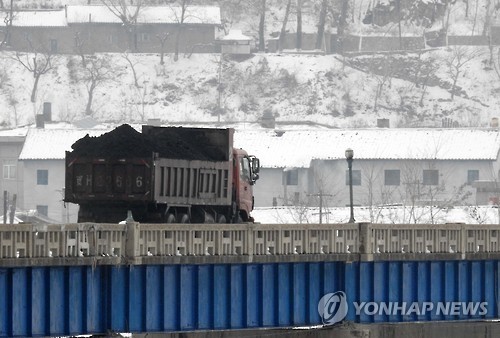North Korea's apparent killing of the half brother of leader Kim Jong-un, a glut in coal production and other factors could have led Beijing to suspend coal imports from North Korea, a US expert said Monday.
China suspended North Korean coal imports Sunday through the end of the year in accordance with the latest UN Security Council resolution adopted in December to punish Pyongyang for its fifth nuclear test in September.
 |
(Yonhap) |
The resolution centers on putting a significant cap on North Korea's exports of coal -- the country's single biggest export item and source of hard currency. The cap was set at whichever is lower between 7.5 million tons or $400 million.
The suspension of coal imports also came days after the death of Kim Jong-nam, North Korean leader Kim's half brother, in what is believed to be an assassination by the regime in Pyongyang, which some experts saw as an affront to China as Kim Jong-nam was close to Beijing.
"This latest action could be a demonstration of discontent with North Korea's suspected murder of Kim Jong-nam for whom the Chinese were providing protection. China is also experiencing a coal glut announcing conterminously a shutdown of hundreds of Chinese coal mines," said Victor Cha, Korea chair at the Center for Strategic and International Studies.
The expert also noted China's recent agreement to import 4,000 metric tonnes of liquefied petroleum gas from North Korea for the first time, which could become an additional source of foreign currency for the government in Pyongyang. The agreement may also provide China with additional reasons to supply North Korea with crude oil for processing, he said.
"The impact of the coal ban on North Korea will not be immediate as it benefited from record earnings ($408.5 million) in coal exports to China" in the fourth quarter of last year, he said.
Cha said Beijing could circumvent its own import ban by utilizing a "humanitarian exemption" loophole in the sanctions, just as it continued to import North Korean coal by exploiting the "livelihood purposes" exemption. (Yonhap)




![[Herald Interview] 'Trump will use tariffs as first line of defense for American manufacturing'](http://res.heraldm.com/phpwas/restmb_idxmake.php?idx=644&simg=/content/image/2024/11/26/20241126050017_0.jpg)

![[Health and care] Getting cancer young: Why cancer isn’t just an older person’s battle](http://res.heraldm.com/phpwas/restmb_idxmake.php?idx=644&simg=/content/image/2024/11/26/20241126050043_0.jpg)

![[Graphic News] International marriages on rise in Korea](http://res.heraldm.com/phpwas/restmb_idxmake.php?idx=644&simg=/content/image/2024/11/25/20241125050091_0.gif)